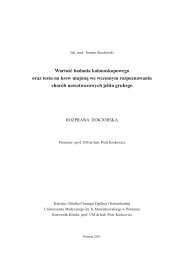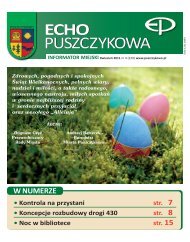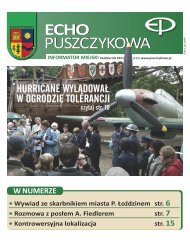MILITARY PHARMACY AND MEDICINE
MILITARY PHARMACY AND MEDICINE
MILITARY PHARMACY AND MEDICINE
Create successful ePaper yourself
Turn your PDF publications into a flip-book with our unique Google optimized e-Paper software.
© Military Pharmacy and Medicine • 2012 • 4 • 106 – 110actions reducing the consequences of the eventis a well-organised communication betweenemergency services units, including the fire brigade,the police, the medical rescue, etc., as wellas between emergency services and the public.Due to technical advancements it is possible toexchange information via the electronic media,however, the basic way of contact between theemergency services, the authorities and the societyis undoubtedly public media, including press,radio and television stations (TV and radio areelectronic media) [3,6].Communication with the media in crisis situationsmay be divided into three stages. The firstof them includes actions preceding a crisis situation,and next two stages – actions during andafter eliminating such a situation [1,2,6,7].Actions preceding catastrophesCommunication infrastructure, consolidating allemergency services and the public, is an inherentelement of the efficient security system. Theabove mentioned mass media, i.e. radio, television,press, and nowadays also the Internet, aremain channels of conveying information. Lackof proper circulation of information between theemergency services leads to chaos, whereas, disturbedcommunication with the media results inmisinterpretation of the event, which may raisemany unfavourable interactions in the public,including panic.Actions preceding a crisis situation are inherentpreparatory stages for various emergencyservices and crisis panels. Continuous updatingof knowledge by people who coordinate actionsof emergency and crisis services, results in progressingimprovement of professional skills [8,9].Constant training, exercises and simulationshelp these services, to a greater or lesser extent,prepare for possible crisis scenarios.Exercises should not only involve rescue services,but they should also include elements of cooperationwith media [7,10]. In the future it willhelp avoid information chaos. It is important tobecome acquainted with the rules of the publicmedia. It is also worth establishing and practisingthe method of appointing persons responsiblefor contacts with the media (spokespersons),creating healthy relationship with the media andReview articlepreparing (adequately to the situation) necessaryinformation for the public. Therefore, establishingprocedures for crisis situations seemsindispensable.Media communicationand legal provisionsCirculation of information between public servicesand media is regulated by legal acts, ethicalcodes and internal regulations. Thereby, suchregulations impose duties on the emergencyservices workers, authorities and journalists.Informing the public about states of danger isdefined by, among others, a notation in the UNUniversal Declaration of Human Rights of 1984[11]. In the face of a crisis situation, people wouldfeel much safer to know that they receive reliableinformation about current actions and changesthat may affect their lives and environment.Act of 26 January 1984 – Press Law, conferredpowers on journalists to obtain informationabout actions of government agencies, publiccompanies and other organisational units,whereas, heads of such units, spokespersons orother persons authorized to convey informationto media are responsible for providing suchinformation [12]. However, according to theabove Act, journalists should make every effortto be careful, reliable and honest while collectingand conveying press materials; they shouldcheck credibility of all obtained informationand publish its sources. According to the Act,the media are obliged to publish (free of charge)statements issued on the basis of acts, announcements,ordinances or resolutions of the centraladministration authorities and governmentadministration authorities in the province, and,what is important for this paper, they are obligedto publish (free of charge) announcements issuedby the government administration authoritiesor local governments and concerning crisis situationsdefined in the Act on crisis managementof 2007 [13].Legal provisions concerning reliable conveyinginformation about events and phenomena in thecountry and abroad, are also included in the Acton the state of natural disaster [14] or in the Acton National Broadcasting Council. Principlesof correct collection of and publication of pressmaterials may be found not only in the above acts106 http://military.isl-journals.com
















